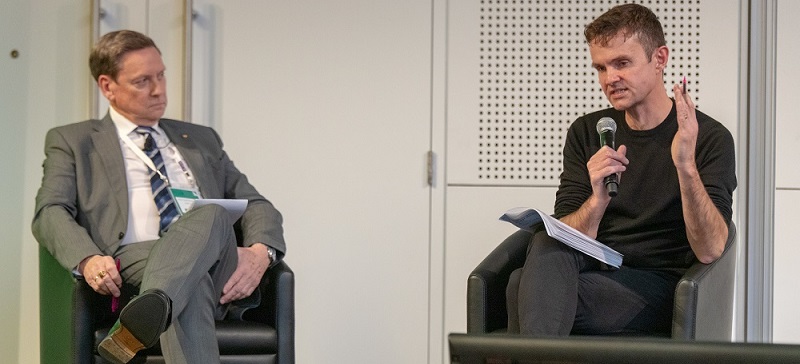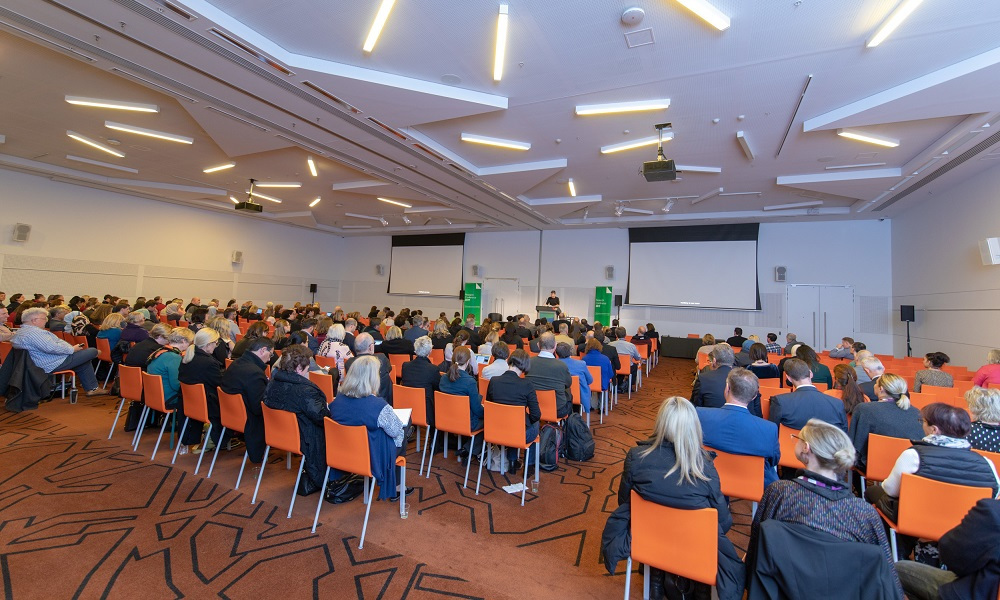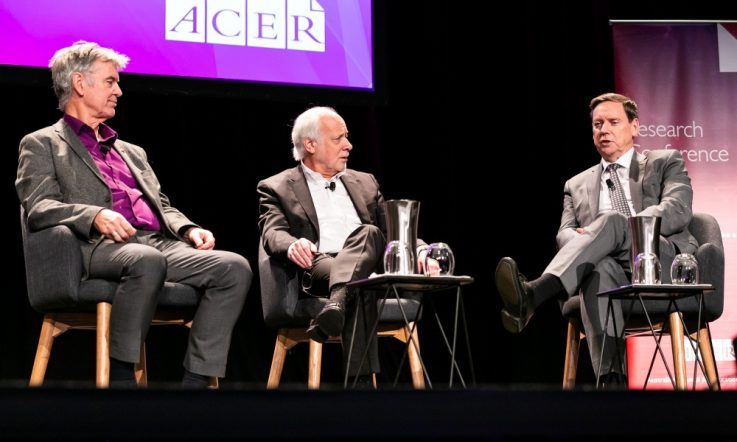This podcast is supported by QUT Podclass – a podcast developed for passionate teachers. Search QUT Teacher Podclass today.
Thanks for downloading this podcast from Teacher magazine. I'm Dominique Russell.
ACER's Research Conference took place this month with the theme – ‘Preparing students for life in the 21st century: Identifying, developing and assessing what matters'. In this episode, we'll take you to the closing session of the conference – the ‘In Conversation' between ACER CEO Professor Geoff Masters AO and Neil Selwyn, a Professor in the Faculty of Education at Monash University. We'll share highlights from their discussion about what schooling might look like in 10 years' time.
Now, this session began directly after Neil delivered the conference's Karmel Oration, so, as you're going to hear a few references to that talk, it's important I give you an understanding of what he discussed.
Neil's Oration was titled ‘On with the 21st century! Preparing Australian education for the 2020s and beyond.' So, it's clear from that title that he took the conference theme to heart. In particular, Neil focused on what education might look like in 2029. He spoke about how there are often three different kinds of predictions when we speak about predicting certain things for the future – the probable, possible and preferable – and how it's important we try to stick to speaking about probable futures, rather than a future that is possible or preferable. This led him to speak about the role of an educator during the times of climate change, the rise of online education and how we can best prepare students for careers of the future. Let's dive in.
Geoff Masters: Neil, thank you so much. I think that's a wonderful way to finish the conference, with your Karmel Oration. As Juliette [Mendelovits, ACER] said, it's provocative, it's made us stop and think about a range of issues, many of which we had not covered in much detail at all during the conference. So, thank you so much for that. I know you've raised the question ‘do we have anything more to say? Anything more to talk about here?'
I thought one way to give you something to talk about might be to try to play the devil's advocate a little bit. So, let me have a go at that and see if there's something you want to respond to. And then we can throw it open again and see whether there are any other issues that people want to take up.
You said that in the circles in which you mix there's often a concern that schools are broken; that there's a question mark about the future of schooling as it exists; that the traditional model of schooling is under attack and that we, as educators, as an education community, need to defend schooling; we need to point out that we need schools, that they're valuable, they're doing a good job.
Playing the devil's advocate, I would almost come from the other direction. My concern is that there are things that are not working in schools and things that we need to change. And my worry is that I can't see how we're going to get them to change. And that's because so much of what will exist in 2029, I think exists now. I mean, the buildings that students are going to attend largely exist, teachers who are going to be teaching in 2029 are largely the teachers in schools now; the curriculum has been in place for what, a decade? I don't see a lot of appetite for change there, the processes for assessing and reporting student learning are enshrined in legislation in some cases, the examination systems across the country that dominate so much of schooling are well entrenched and I don't see much change, ATAR is pretty well entrenched.
So my concern – and I'll get you to react to this – my concern is almost the opposite. The trade off, I think, that we need is the balance between defending what we have, but at the same time, recognising what's not working and what we need to change and thinking about how we bring about change in the system. …
Neil Selwyn: Yeah.
GM: There you go.

Image: Professor Geoff Masters and Professor Neil Selwyn at Research Conference 2019. Photo: ACER
NS: Well. You know when you get invited to things and you think ‘why the hell did they ask me to do this?'
I figured that you didn't ask me here to kind of just talk about digital literacy and all the stuff that you were talking about for what my research is on. And I also figured that a keynote was meant to be provocative. So there was a little bit of me playing the devil's advocate first–
GM: Yes. Good.
NS: –before you played the devil's advocate. Now it's just going to become really Meta. So, yeah, clearly these are all provocations to get us thinking about things. And I think we do need to point out what's wrong. And, as I said, schools, teachers, skills, nothing's perfect, and there's no point saying that it is. But, we are quite good at pointing out what's wrong with education, because I think, as educators, we are reflexive, we are, we are critically minded, and we do want to make things better. And we are, I think we're fully aware of what needs to be fixed and what is not so good.
But we're not very good at doing the flipside. I agree with you, the perfect way's in the middle. So, I always tell students, you know, social science students, the answer's never true, false, black, white, yes, no. It's always in the middle, it's always grey, it's always messy, it's always a bit of this and a bit of that. And clearly this is the case here as well. But my worry is that we've tipped too far towards being quite self-critical and actually being self-critical in public. And we need to balance it with being far more positive about what we don't want, not throw the baby out of the bath water. So I guess that's where I was coming from.
One of the things that worries – I don't think schools are going to disappear, but I do think they may get dumbed down to the level of just being kind of glorified childcare with a bit of online education tacked onto the side of it. And I do think teachers might end up just being employed people that just steward classrooms and don't have the expert domain skills and the pedagogic skills that we see now. My worry is that we get this kind of, as I say, this two-tier system.
I agree with you – the basic materials of 2029 are what we have now. The staff, the buildings, the curriculum. But as I was trying to get at with the skills, I don't think we need to change any of that to make the curriculum really work. I don't think we need to change the human workforce that we have to make it really work. And the buildings are just the buildings. I mean, they could be better but you get what you get. And I think you could use those basic materials that we're going to have and just rethink them, re-tweak them, refocus them, push them in a slightly different direction, take away some of the pressures which might be the exams and ATAR and the other things you talked about. And then it might work slightly better. It's never going to be perfect. So, yeah, I think I agree with you. That's how I'm going to get out of this, by agreeing with everything that you say.
GM: Okay, well we'll meet somewhere in the middle and we'll agree on that.
Dominique Russell: You would have heard Neil mention a ‘two-tier system' just there. It's something he touched on in his Karmel Oration, and it was how he described the notion of how a teacher's role could change with the continued influence and use of Artificial Intelligence (AI), and other technology. As he'll mention soon, he worries that online education could change the role of the teacher and in some cases they could oversee classrooms for behaviour management purposes, but won't have the pedagogic skills that educators have today.
GM: I mean I, talking about the two-tier system, I think your slide on the two-tier, that's concerning if we are headed in that direction. And, again, in the spirit of being provocative and playing devil's advocate, one of the things that one might be concerned about is that what you see now is many low-skill jobs disappearing. You know, as more work is taken over by machines and machines are learning themselves and becoming smarter. It's no longer adequate for students to be leaving our schools with low levels of skill. They're going to end up – once it worked, once we had a need for people with manual and low levels of skill, but I think in the future, pretty clearly, what we will need are workers who can do things that machines can't. And you referred to some of those things.
But, does that mean – this is the question I ask myself – does that mean that the kinds of workers we need in the future, the kind of workforce we need in the future, is a workforce that has deep knowledge? Deep understanding? Conceptual understanding? And do we run the risk of creating the two-tier system that you talked about, if we limit the learning of some students to skills that are actually difficult to apply if you don't also have a deep knowledge base. So, you know, it's fine to talk about collaborating or solving problems or creating new solutions or using technology. But if you're doing that, if you learn how to do those things, but you don't have a deep knowledge base, are you setting people up for futures where they're going to have more difficulty getting jobs and could end up being economically disadvantaged throughout their lives as a result? So, again, I'm being provocative.
NS: Yeah, yeah, yeah, there's a couple of things there. I would love schools to give everybody a deep knowledge base regardless of what they do for their job. I think a deep knowledge base could be really, really useful for just life. So in that respect I would never say ‘no, we don't need to be doing that'. And I think the same with conceptual understanding, I think there's so much that you need knowledge for that doesn't involve your job, then we shouldn't kind of say just because it's not economically aligned, it has no value. So, again though, I want to break this connection between schools and work and schools and employability. Deep knowledge is great, why not, as much as you can get.
… I think there are new skills we need to start thinking about. The ability to work alongside machines or work with machines is a skill that is going to be increasingly important as work is done by machines. We're not, people are not going to disappear from the equation altogether. Just interesting, something interesting to think about.
Just coming back to this idea of the two-tier system. I've been looking at how AI has been pushed in China and there's a very popular Squirrel AI, it's called, if you want to look it up, and they've got this personalised learning system that basically proctors and takes the student through learning and then recommends what they should do next and the tutor kind of, the system actually tutors them, it's a personalised learning system. And the idea is that you don't need a teacher and this Squirrel AI has set up the systems that are used in schools and then after schools and you can go to one of their after school centres and just be, sit on the system and it'll teach you for an hour. You pay a bit more, you can get an online tutor that will help you through it. If you pay a bit more than that, you get a real life person.
And that's what worries me about the school system, when I say the two-tier thing. You will still have humans in the room making sure Ralph doesn't pull the plug out or someone else – discipline reasons. But they won't have the expert knowledge and they won't be telling students what to learn and how to learn. That will be done by the AI. That's a worry, I think. And then if you want your kid to get the education that we all value as educators, or most of us do, you're going to have to pay for it. You can see it happening in the States and you can see it happening in other places and I think that's a shame. There you are, two answers to two questions.
You're listening to a Teacher podcast special, proudly supported by QUT Podclass – a brand new series of free podcasts all about teaching and teachers. Join us as we explore tips and tricks on managing teacher wellbeing, finding the right career mentor and getting greater engagement from students in the classroom. Search QUT Teacher Podclass to listen today.
DR: Neil's about to mention Professor Dragan Gašević here, who also presented at the conference. He's a Professor of Learning Analytics at Monash University in the Faculty of Education and Adjunct Professor in Education in the Faculty of Information Technology. His session centred on the using learning analytics to measure 21st Century skills. I'll place a link to his conference paper in the transcript of this podcast. Let's jump back in.
GM: Well, let me keep playing the devil's advocate. I mean, how big a worry is it really? One of the things we've always wanted to be able to do in our schools is to personalise learning, to differentiate teaching. That's been extremely difficult when we've had very crowded curricula that teachers have had to teach and when we've had large groups, so it's been almost impossible. One of the real advantages of technology and AI, it seems to me, is that you open up the possibility for the first time maybe of really being able to use the technology in intelligent ways to understand where individuals are up to in their learning, to provide better targeted, more tailored learning opportunities, to meet students at their points of need. …
NS: If we could get all that happening here it would be absolutely amazing, but it would also be completely utopian. There's no way you could do that, that's absolute nonsense. Not you.
GM: I'm happy, I'm happy for you to call it nonsense.
NS: There's so much hype about data, big data, learning analytics. And it's so much going – and actually if you talk to people like Dragan Gašević, who was talking this morning, if you talk to these data analytics people, they're fully aware of the limitations of what they're doing. There are so many aspects of learning and teaching that are not quantifiable, that can't be captured in data points, that therefore can't be analysed and therefore found at all. So much stuff, and so the bandwidth is massively narrowed if you start relying on data to tell you how to do things. And there's been massive walkouts in different states in America of students against the summit learning system, for example – the personalised learning system – ‘we do not want to be taught by those machines', because if you actually use one of these things, you find out that personalised learning is not personal at all, it's nothing to do with you as a person, it's mass customisation. Getting lots of people through. You all end up at the same point, just in slightly different ways. And so it leads to, one of the things about personalised learning is it really dehumanised. It takes the human out of them. And again, you end up, start saying things like that and you end up looking like a hippie, because it's ‘what do you mean by being a human?' but there is an element to education being a conversation, being a kind of, it's a social thing as well. And so the analytics and the data can push you in certain ways, but it's very, very broad brush strokes.
So, ideally, you've got a professional expert teacher in a classroom being guided by that kind of system. And that's perfect, because a teacher can see that's a bit off, it's really better if he does this or she does that. But you know as soon as you have a system like that in an education system, that managers are going to say, well, actually it's going to save us a lot of money not having a trained teacher because most – and then that's where the slippage comes. So, ideally, absolutely wonderful, but that's so much pie in the sky that we need to move right to what's really taking place with these systems. And these systems can be useful, but I'm worried that the idea ‘oh, it's going to be an assistant' to a really, highly skilled teacher, there's a fine line between being assisted and being guided, and then a fine line between being guided and being directed. And then you've got this big professionalisation. And you look at some of the systems, like the Bridge Academy systems say in Sub-Saharan Africa and it's literally a lesson scripted on a tablet, the person, and they're not a teacher, reads the lesson out. Data analytics whir around in the background and the table tells the person what to do next, and that's a teacher. That's not a teacher.
GM: So, if we think about ‘probable futures' – I understand your point – if we think about ‘probable futures', how do you think the work of a teacher in 2029 might be different from the work of a teacher now, in practice?
NS: Yeah, well, I mean data. We need teachers that can do data. And I think the ‘datafication' of schools is clearly happening already and it's really important. What I'm interested – and I'm just plucking stuff I'm thinking about now – but we want teachers that can really make, be supported and empowered and data can be rocket fuel. But there's a danger, and I'm finding this in the research I'm doing at the moment, there are small clusters of teachers that are using data in interesting ways, and those that are doing data. But for most teachers, data is done to them. It's something that is used as a stick rather than a kind of carrot. And I'm really worried that we might end up in a system that's data driven, but not in a good way, and data intensive, but not in a good way.
But, if you flip it over, data could be really, really useful if we expand what we understand as data, so it's not just learning and teaching related, but it's also related to other aspects, it's qualitative as well as quantitative, it's not just driven by learning systems, but maybe generated by students. So I think, again, coming back to the theme of the talk, data is going to be an important thing. But how that colours the conditions and the characteristics of what a classroom is, is not set in stone. If we really went for it now, Australia could have a really, really interesting data driven system, or it could have a really, really dull drudge-like data driven system. It's not a choice, but it's certainly something we can influence. So, I think, certainly data driven, I'd like to think there are still properly trained teachers in classrooms interacting with kids, knowing who – you know, all that stuff. But again, that's slipping away.
Victoria was trialling a facial recognition class registration software recently. Great, it saves two and half hours a week of the teacher's time not having to call the roll call. But, what's lost in that two and half hours? Often the roll call is a great opportunity to actually say ‘oh, you're going to the UK tomorrow? How's that going to–' you know, just have those little moments, there's all those, so my worry is that the character gets eroded.
GM: Perhaps, related to that, one of the things that we sometimes talk about within ACER is the role of technology companies now in schooling. And we see assessment solutions, reporting solutions, data management, you know, and so on. And general management systems that have been developed, and we sometimes wonder about how much educational input there actually was into it, and whether the, some of the systems we're seeing, reflect best practice. …
NS: Oh, absolutely. Yeah. Geoff, it's very nice of you to ask me to talk about stuff I had to leave out of the talk. So, one of the other big things I wanted to talk about was this idea of the commercial actors and interests and the role they play in education – and you start using jargon now, but you know – the constellation or ecosystem, whatever you want to call it.
It's clearly already an issue. We have big commercial actors, we have small commercial actors, increasingly playing a role in public education. And that's not a terrible thing, I'm not saying it's a bad thing at all, it's just a thing. And we need to work with it, but work with it from a point of actual empowerment, rather than just having things done to it. I think it's really, really important. And you see it in the tech sector all the time. We cannot do digital technology without big companies. They make the technology, they design the technology. I dread to think what, if a State Government education department tried to develop its own online system, what that would look like.
GM: I think some have tried.
NS: But we need big tech, no problem at all. And so, clearly big tech is playing more and more of a role, but what worries me is you can go into a school now and they'll proudly say, ‘oh, we don't worry about technology, we're a Google school', as if that's a really good thing, and I'm like ‘oh dear'. So they have the Google Chromebooks, Google Class [Classroom] for Education, G Suite for Education. Google are now involved in formulating school policies if you want it, they can train teachers if they want it.
You see some companies are also having prescribed curriculums. So you can go into a school now and what's being done in the classroom, how it's being done, when it's being done, has nothing to do with the professional judgement of the school. It's driven by the commercial company, and their products and their systems. They're configuring classrooms.
Now, it's really interesting in some ways that these actors do think differently. They think outside the box. You get some really interesting innovative solutions, or ways of doing things. But, on the other hand, they are taking, kind of, the kind of hidden bit of the classroom. And that's a worry. Not that we don't want it to happen at all, but it would be great if educators had more of a say in how things were being done. Now that might be working for the companies, as you said, or advising the companies, or forcing the companies to actually be more responsive. But we need to be aware a) that it's an issue, and b) that we need to do something about it.
Schools are massive consumers of these products. So at least there's some consumer power to say, ‘well hang on a minute, we don't want it done like this, we want you to do this'. That might be one step. It might also be a step to insist that things are configured in different ways and we don't just have the default. Or it might be that schools are empowered to work collectively to look for alternate solutions. There's lots of open source, for example, there's lots of ways of doing things differently without having to pay for it. And also schools need to be confident to work right around the companies as well as engaging with them.
So I think we need to really worry about how these companies, big and small, are increasingly directing what takes place in schools. In 2029 that's going to be a huge issue. Schooling is, education is such a profitable market place. Education data, health data and financial data are three most profitable types of personal data. So companies are desperate to get into schools and start mining stuff out.
The data thing is another issue, I'm really interested in this. So much good data gets sucked out of Victorian schools and schools all around Australia and goes to Silicon Valley or wherever else. If we could actually put a stop to that, collate it all ourselves, we could do some really interesting stuff in terms of learning what takes place in classrooms. But we don't think about it, because we're just happy to get the free software. And it's not free. So I think there's all sorts of issues that, and tech is just one area. There's all sorts of other industry areas that are implicit in schooling now and, you know, I think that's not going to go away.
That's all for this episode. To access the full transcript for this podcast and other content from Research Conference, head to http://www.teachermagazine.com.au. And if you'd like to listen to more from Teacher, you'll find us by searching ‘Teacher ACER' wherever you get your podcasts – on Apple Podcasts, SoundCloud, and now, on Spotify as well. While you're there, make sure you subscribe to our channel, so each new episode drops into your feed as soon as it's available.
For more Teacher content from Research Conference, visit the Teacher archive.



